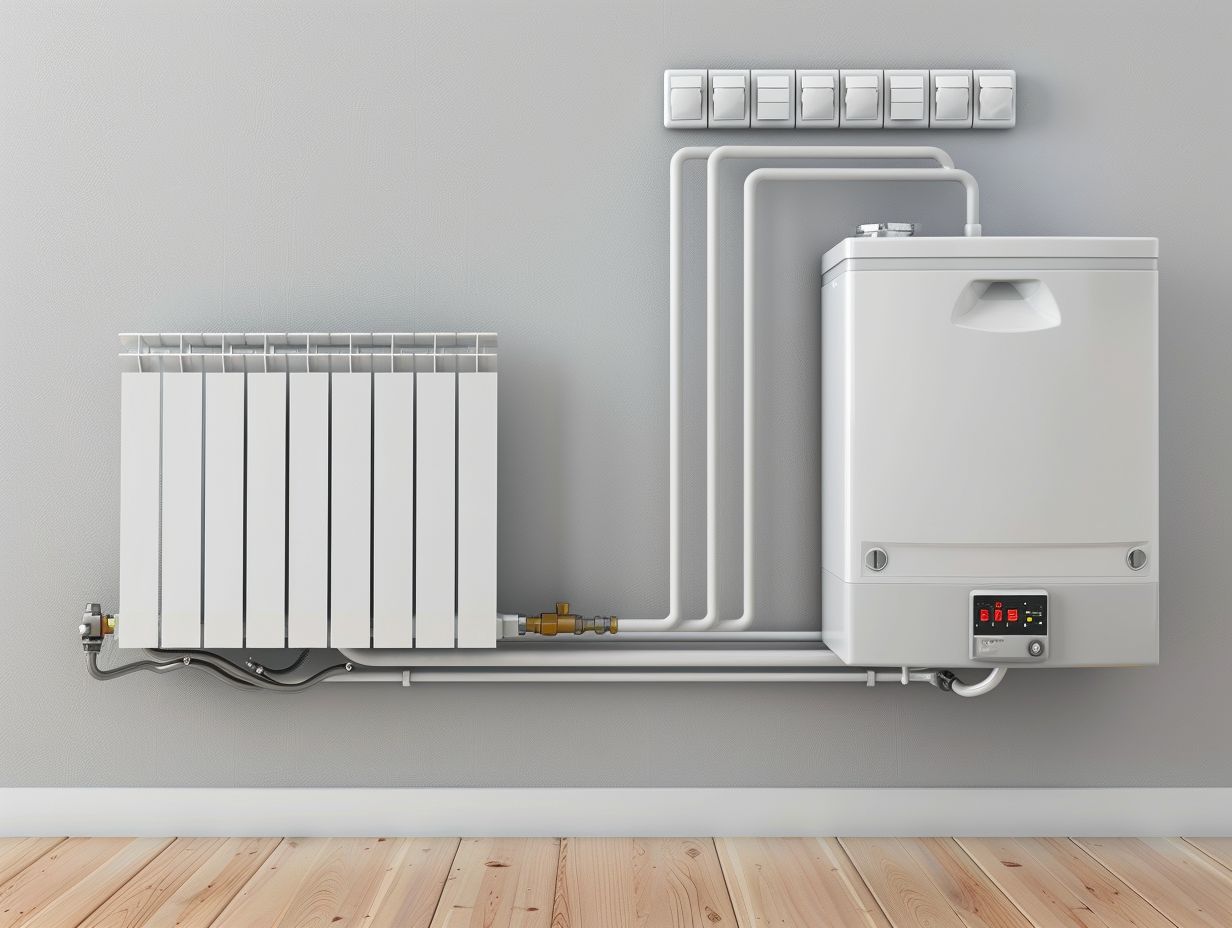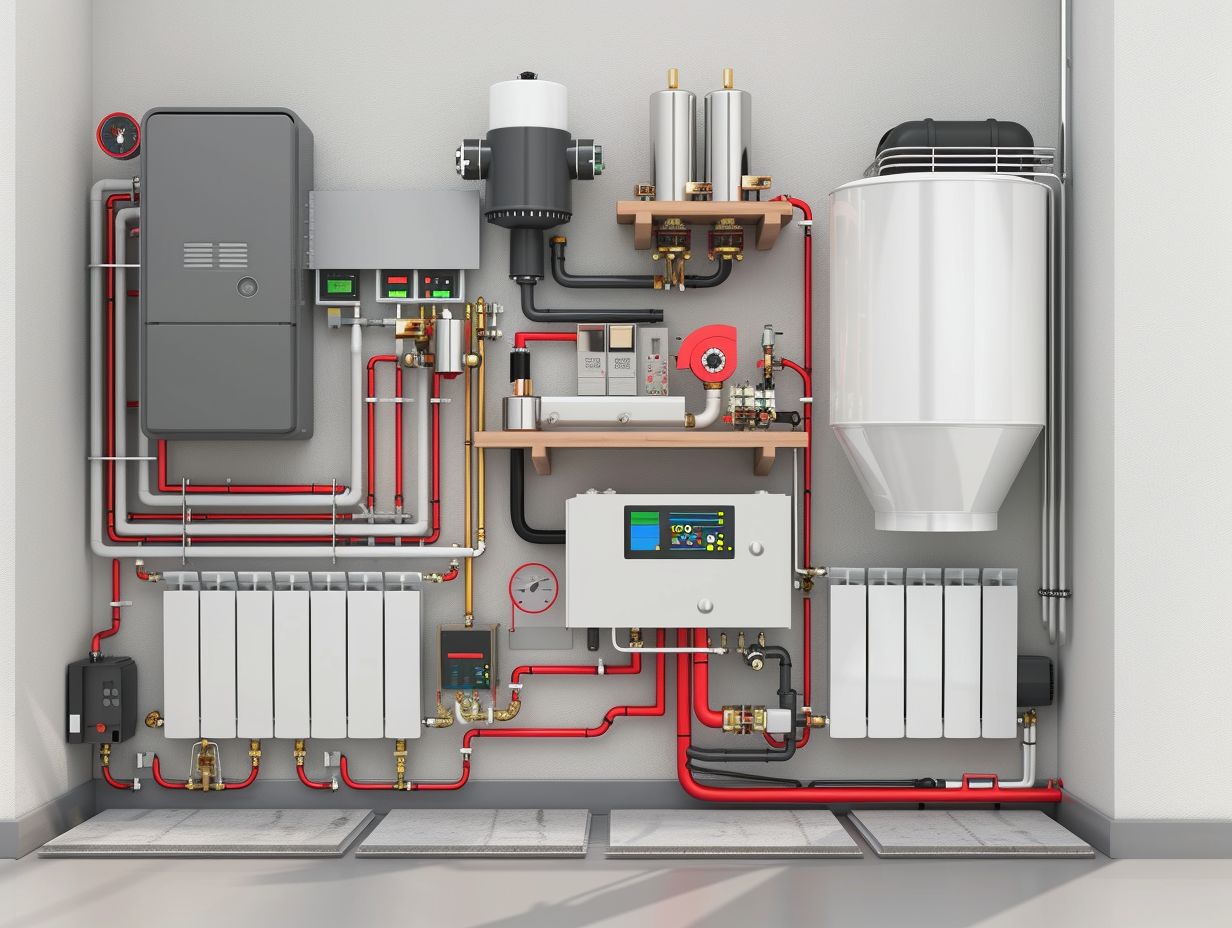Are you in the process of choosing between central heating and dual fuel heating for your home? This article delves into the advantages and disadvantages of both heating systems, providing a detailed comparison of their costs and efficiencies.
Additionally, maintenance and repair factors are discussed to assist you in making a well-informed decision.
By the conclusion, you will have acquired a comprehensive knowledge of which heating system aligns best with your needs. Let’s delve into the details and identify the ideal heating solution for your home!
Key Takeaways:
 1.
1.
- Central heating provides consistent warmth throughout the house, while dual fuel heating allows for flexibility with different heating sources.
- Central heating may have a higher initial cost, but can be more efficient in the long run, while dual fuel heating can be more cost-effective for those who switch between fuels frequently.
- Central heating may have a larger environmental impact due to its reliance on electricity or gas, while dual fuel heating allows for the use of renewable energy sources.
Pros and Cons of Central Heating
Central heating systems provide a convenient and effective solution for maintaining consistent warmth throughout your property by utilising a network of radiators connected to a single heat source. While central heating ensures efficient distribution of heat to all rooms, it can also present challenges in terms of energy usage, especially with gas central heating systems.
Advantages and Disadvantages
Central heating systems offer you a convenient and efficient solution for maintaining consistent warmth throughout your property by utilising a network of radiators connected to a single heat source. While central heating ensures the effective distribution of heat to all rooms, it can present challenges in terms of energy usage, especially with gas central heating systems.
Gas central heating is renowned for its high efficiency in evenly distributing heat across various rooms, allowing for individual temperature control in each space. This feature offers personalised comfort for occupants, ensuring they can tailor the warmth to their liking.
However, the maintenance of gas central heating systems can incur considerable costs, necessitating regular servicing to guarantee proper functioning and compliance with safety standards.
Fluctuating gas prices can also impact the overall operational expenses, underscoring the importance for homeowners to carefully assess the long-term financial implications before selecting this heating option.
Pros and Cons of Dual Fuel Heating
Dual fuel heating systems combine the benefits of various energy sources, usually gas and electric elements, to offer a versatile and efficient solution for maintaining optimal room temperatures. These systems provide flexibility in energy usage and heat output, making them a preferred choice for households in search of energy-efficient heating technology.
Advantages and Disadvantages

Dual fuel heating systems combine the benefits of different energy sources, typically gas and electric elements, to provide you with a versatile and efficient solution for maintaining optimal room temperatures.
These systems offer flexibility in energy usage and heat output, making them a popular choice for households seeking energy-efficient heating technology.
One of the key advantages of dual fuel heating systems is the ability to switch between gas and electric power based on cost-effectiveness and availability, allowing you to optimise energy usage according to your preferences.
These systems often feature advanced programmable thermostats, enabling precise heat control and customised scheduling for enhanced comfort and efficiency.
Installation of dual fuel systems can require professional expertise, potentially increasing upfront costs and complexity. It’s important to consider the long-term savings and environmental benefits against the initial investment when evaluating the suitability of dual fuel heating for your home.
Cost Comparison
When comparing the costs associated with different heating systems, you must consider factors such as installation expenses, maintenance requirements, energy usage efficiency, and long-term operational costs. These factors are crucial in determining the overall affordability and feasibility of each heating solution.
Initial and Long-term Costs
When comparing the costs associated with different heating systems, you need to consider several factors to determine the overall affordability and feasibility of each heating solution. Factors such as installation expenses, maintenance requirements, energy usage efficiency, and long-term operational costs all play a significant role.
Installation expenses can vary greatly depending on the type of heating system you choose. For instance, a central heating system typically requires a higher upfront cost than a portable heater.
Maintenance considerations also differ; some systems may require regular professional servicing, while others can be easily maintained by homeowners. Energy efficiency is a crucial factor to consider, as more efficient systems can result in lower monthly energy bills.
By carefully evaluating all these factors, you can effectively minimise the overall heating costs over time and make an informed decision about which heating system is the most cost-effective and suitable for your needs.
Efficiency Comparison
When evaluating the efficiency of heating systems, you need to assess their energy usage, heat transfer capabilities, and overall impact on reducing heating bills.
It is important to prioritise energy-efficient systems that maximise heat output while minimising energy wastage. These considerations are essential for ensuring cost-effective and environmentally friendly heating solutions.
Energy Usage and Environmental Impact
When assessing the efficiency of heating systems, you need to analyse their energy consumption, heat transfer capabilities, and overall effectiveness in lowering heating costs.
It is crucial to prioritise energy-efficient systems that maximise heat production while minimising energy wastage to achieve cost-effective and environmentally friendly heating solutions.
To enhance the energy efficiency of heating systems, consider integrating advanced technologies such as programmable thermostats and smart heating controls. These innovations enable users to establish specific temperature settings and remotely manage heating preferences, thereby reducing energy usage and associated expenses.
Incorporating renewable energy sources like solar panels or geothermal systems for heating purposes can significantly decrease households’ carbon footprint and promote sustainable heating practices.
Maintenance and Repair Considerations

Maintenance and repair considerations are crucial aspects in ensuring the longevity and optimal performance of your heating system. This involves conducting periodic inspections, completing upkeep tasks, and addressing any system inefficiencies or malfunctions through occasional repairs. It is imperative for effective system management to understand the maintenance requirements and associated costs.
Requirements and Costs
Maintenance and repair considerations are essential aspects in ensuring the longevity and optimal performance of heating systems. This involves conducting periodic inspections, performing upkeep tasks, and making occasional repairs to address any system inefficiencies or malfunctions.
Understanding the maintenance requirements and associated costs is crucial for effective system management. Regular maintenance not only improves the efficiency of heating systems but also extends their lifespan. By conducting routine checks on components such as filters, vents, and thermostats, you can prevent potential breakdowns and costly repairs.
Following manufacturer guidelines for maintenance is important to avoid voiding warranties. It is wise to budget for maintenance costs, including professional servicing and replacement parts.
Technological advancements, like smart thermostats and digital monitoring systems, have simplified the process of tracking system performance and identifying issues early on. This can help reduce overall maintenance expenses in the long run.
Which Heating System is Right for You?
When selecting the appropriate heating system for your property, it is crucial to consider factors such as room requirements, heat output preferences, energy efficiency goals, and budget constraints. Whether you are considering central heating or dual fuel heating, choosing the right system is essential to guaranteeing optimal comfort and cost-effective heating solutions.
Factors to Consider in Choosing Between Central and Dual Fuel Heating
When selecting the appropriate heating system for your property, it is crucial to consider various factors. These include room requirements, preferences for heat output, energy efficiency objectives, and budget limitations. Whether you are leaning towards central heating or dual fuel heating, choosing the right system is vital for ensuring optimal comfort and cost-effective heating solutions.
In the case of central heating, it is important to assess how the system will meet the specific needs of each room. Rooms with high heat demands, such as living areas, can benefit from central heating’s ability to distribute heat consistently.
On the other hand, dual fuel systems offer flexibility by enabling you to switch between different fuel sources based on cost and availability, which can be advantageous in managing energy expenses.
When making your decision, it is essential to prioritise energy efficiency. Modern central heating and dual fuel systems come with varying levels of efficiency ratings that have an impact on long-term operational costs. Considering energy efficiency in your choice of heating system is crucial for achieving cost savings and reducing environmental impact.
Frequently Asked Questions
What is the difference between central heating and dual fuel heating (radiators)?

Central heating uses a single source, typically a boiler, to heat water and distribute it throughout a building via radiators. Dual fuel heating combines a traditional central heating system with an alternative heat source, such as electric heaters or a heat pump.
Which one is more cost-effective, central heating or dual fuel heating?
It ultimately depends on your specific needs and usage. Generally, central heating is more cost-effective for larger homes or buildings, while dual fuel heating may be more efficient for smaller spaces.
What are the main advantages of central heating?
Central heating is a reliable and consistent heating system that can be controlled with a thermostat. It also tends to be cheaper to install and maintain compared to dual fuel heating.
What are the main advantages of dual fuel heating?
Dual fuel heating offers the flexibility to switch between different heat sources based on cost and efficiency. It can also be a more environmentally friendly option, depending on the type of alternative heat source used.
Can I switch from central heating to dual fuel heating?
Yes, it is possible to switch from central heating to dual fuel heating. However, it may require some modifications to your existing central heating system and it is best to consult a professional for advice and installation.
Which one is better for the environment, central heating or dual fuel heating?
Both central heating and dual fuel heating can be environmentally friendly options, depending on the type of heat source used. Gas and oil central heating emit carbon emissions, while electric dual fuel heating can use renewable energy sources. It is important to research and consider the environmental impact of both options before making a decision.

